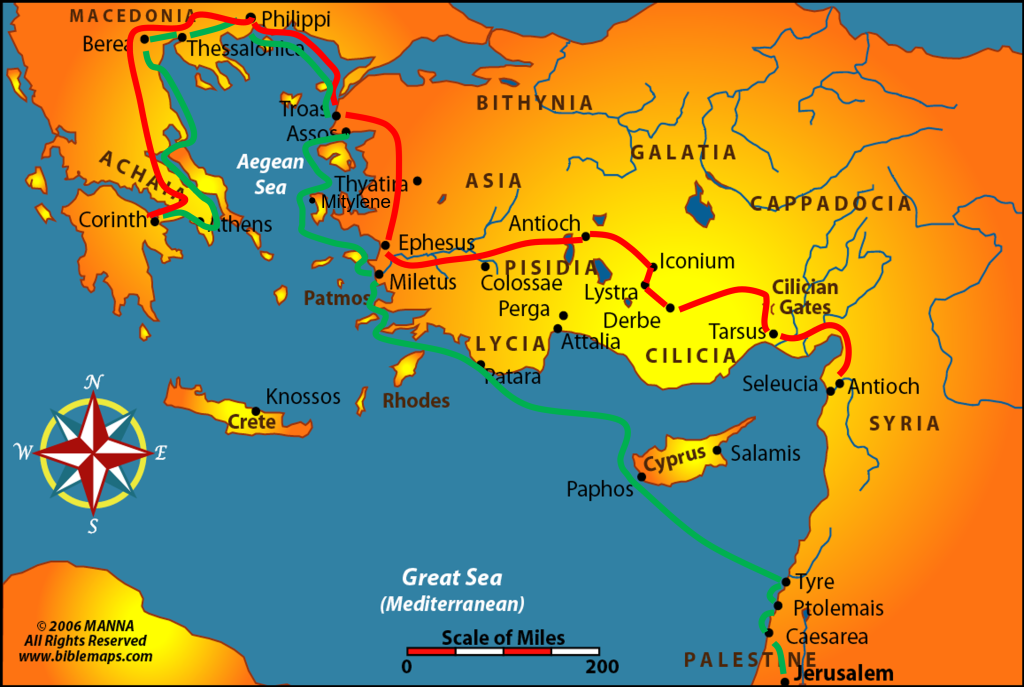| Note | Date | Event | Reference(s) |
| y. | Spring AD 53 – 57 | Third Missionary Journey | Acts 18:23 – 21:16 |
| Asia Minor | Acts 18:23 | ||
| z. | AD 53 – 56 | Ephesus | Acts 19:1-41 |
| aa. | Winter AD 56 – 57 | Macedonia – Corinth (Greece) – Troas | Acts 20:1-12 |
| ab. | Spring AD 57 | Troas – Assos – Mitylene – Samos – Miletus | Acts 20:13-38 |
| ac. | Miletus – Cos – Rhodes – Patara – Tyre – Ptolemais – Ceasarea – Jerusalem | Acts 21:1-16 |

y. Paul didn’t stay long in Antioch, probably only 7 or 8 months, and then set out on his third journey in the early spring of AD 53. He headed north to visit the churches of southern Galatia and Phrygia, i.e. Antioch, Lystra, Derbe and Iconium, that he had established on his first journey.
z. Ephesus was 3 kilometres southwest of present-day Selçuk in İzmir Province, Turkey. In Paul’s day, Ephesus was the most important city of the Roman province of Asia, located on the western shore of Asia Minor, and was also well known as the “guardian” of the temple of Artemis or, as the Romans called her, Diana. The growth of the church in Ephesus and the impact of the gospel was proving a threat to the idolatrous cult of Artemis (Diana) in the city.
Paul spends three years in all in Ephesus (cp Acts 20:31), and towards the end of that period he begins to think about the next stage of his travels and ministry, resolving to travel back to Jerusalem and then to head for Rome and, as we learn from Romans 15:24, 28, then on to Spain. As someone called to a pioneer gospel ministry among the Gentiles, with a policy of not building on another’s foundations (cp Romans 15:20), Paul is always prayerfully looking to new horizons.
No doubt in preparation for restarting his travels he sends Timothy and Erastus ahead of him into Macedonia, and then, before he actually leaves Ephesus, a riot breaks out. Each Spring, at the beginning of the month of Artemision there was a special festival in honour of Artemis and it may have been this event, in the Spring of AD 56, that brought things to a head in the conflict with the gospel. Seeing a dramatic fall in their income from the sale of silver shrines, the silversmiths of Ephesus, led by Demetrius, organise a mass protest, initially dragging two of Paul’s travelling companions into the huge open-air theatre in the city which still stands to this day. Paul, hearing of these developments, tries to intervene personally but is restrained by his friends.
While in Ephesus, Paul wrote Galatians and 1 Corinthians.
aa. After three years in Ephesus, Paul went through Macedonia and on to Corinth in Greece where he spent the three winter months (AD 56 – 57). He intended to go to Syria but was forced to change his plans because of a plot to attack him, and so retraced his steps through Macedonia, stopping in Philippi where he celebrated the Passover (April AD 57) and then sails to Troas.
ab. Luke tells us that Paul was keen to get to Jerusalem in time to celebrate Pentecost, 50 days after celebrating the Passover/Easter in Philippi (20:1-12). Paul travels overland from Troas to the port of Assos, a distance of about 20 miles, and there joins the rest of the group who have travelled by sea. Three days later they arrive in Miletus, from where Paul calls for the elders of the church in Ephesus, some 30 miles away, to come and meet with him. He assures them that this will be the last time they see each other on earth and, amid scenes of great emotion, he takes his leave of them.
ac. The missionary party sail on via the islands of Cos and Rhodes, changing ship at Patara and travelling across the Eastern Mediterranean Sea, landing at Tyre. Here they stayed for seven days with local believers while the ship was being loaded.
They travel on to Ptolemias, where they stay for one day with fellow believers and then sail to Caesarea, which served as a port for Jerusalem. While they were in Caesarea, a prophet called Agabus visits them and, in the style of one of the Old Testament prophets, enacts what he believes will happen to Paul in Jerusalem. Despite the tearful pleas to change his plans in the light of this prophecy, Paul will not be dissuaded from continuing on his journey, regardless of what awaits him in Jerusalem. Paul arrives in Jerusalem in late May of AD 57, in time for the feast of Pentecost.
During these travels, Paul wrote 2 Corinthians and Romans.